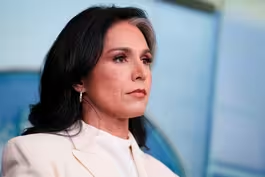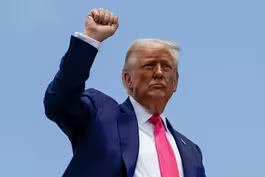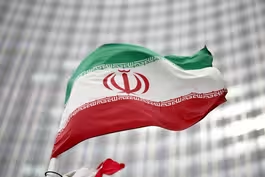
What's in Trump's new AI policy and why it matters
Clip: 7/23/2025 | 6m 37sVideo has Closed Captions
What's in Trump's new AI policy and why it matters
President Trump unveiled his approach to the development of AI. Surrounded by some of the biggest names in tech, he signed three executive orders. One targets what Trump called "ideological bias" in AI chatbots, another aims to make it easier to build massive AI data centers and the third encourages the export of American AI tech. Amna Nawaz discussed the implications with Will Oremus.
Problems playing video? | Closed Captioning Feedback
Problems playing video? | Closed Captioning Feedback
Major corporate funding for the PBS News Hour is provided by BDO, BNSF, Consumer Cellular, American Cruise Lines, and Raymond James. Funding for the PBS NewsHour Weekend is provided by...

What's in Trump's new AI policy and why it matters
Clip: 7/23/2025 | 6m 37sVideo has Closed Captions
President Trump unveiled his approach to the development of AI. Surrounded by some of the biggest names in tech, he signed three executive orders. One targets what Trump called "ideological bias" in AI chatbots, another aims to make it easier to build massive AI data centers and the third encourages the export of American AI tech. Amna Nawaz discussed the implications with Will Oremus.
Problems playing video? | Closed Captioning Feedback
How to Watch PBS News Hour
PBS News Hour is available to stream on pbs.org and the free PBS App, available on iPhone, Apple TV, Android TV, Android smartphones, Amazon Fire TV, Amazon Fire Tablet, Roku, Samsung Smart TV, and Vizio.
Providing Support for PBS.org
Learn Moreabout PBS online sponsorshipAMNA NAWAZ: President Trump today unveiled his broad approach toward faster development of A.I., with new proposals that he says would reduce regulation, accelerate innovation, and position the U.S. ahead of China.
The president spelled out his vision at an A.I.
summit in Washington a short time ago surrounded by some of the biggest names in tech, including Silicon Valley entrepreneur and White House A.I.
and crypto czar David Sacks.
DONALD TRUMP, President of the United States: Whether we like it or not, we're suddenly engaged in a fast-paced competition to build and define this groundbreaking technology that will determine so much about the future of civilization itself.
America is the country that started the A.I.
race, and as president of the United States, I'm here today to declare that America is going to win it.
AMNA NAWAZ: President Trump also planned to sign three executive orders on A.I.
One reportedly targets what the administration called ideological bias in A.I.
chatbots.
Another aims to make it easier to build massive A.I.
data centers and the energy infrastructure they require.
And a third encourages the export of American A.I.
tech to foreign countries.
To help us understand the implications and questions around this approach, we're joined by Will Oremus.
He is tech reporter at The Washington Post.
Will, thanks for joining us.
You were watching the president's speech just moments ago.
Before we dig into the details, just big picture here, what is the vision of A.I.
that President Trump is laying out, and how different is it to the approach we saw from President Biden?
WILL OREMUS, The Washington Post: It's a complete 180.
So, under President Biden, there was an effort to balance the potential of A.I.
to benefit society with what we're seeing as the potential grave risks of this technology that might overturn many areas of human endeavor in disruptive ways.
That executive order that President Biden had signed on A.I.
was tossed out the window on President Trump's first day of his second term.
And now we're seeing what President Trump's vision looks like.
It is very much about a race.
We are trying to beat China in A.I.
He envisions a future where American firms and their technology become the global standard for A.I.
around the world, and this plan is designed to speed that.
AMNA NAWAZ: So, from the folks you have talked to, are there concerns about the downstream effects of unshackling this industry, of pulling back a lot of the restraints that have been there?
WILL OREMUS: Yes, well, to be honest, there aren't a ton of restraints there now, but what restraints are there may be in some peril after this plan.
What Trump wants to do is, in his words, roll back a lot of the red tape that is holding back innovation.
And one way that this plan proposes to do this is to try to withhold federal A.I.
spending from states that enact what the administration considers to be burdensome regulations on A.I.
Now, they haven't spelled out what they consider burdensome.
They also say they want to leave room for prudent regulation of A.I.
So there's a lot of subjectivity in there.
But the basic idea is that President Trump doesn't want states passing laws, for instance, that may deal with A.I.
and privacy or may deal with discriminatory applications of A.I.
or may try to require transparency on the part of A.I.
developers.
He would prefer to see one federal standard that all the companies have to abide by.
But, of course, that would likely require Congress agreeing to pass a law, which is always difficult these days.
AMNA NAWAZ: And we're expecting those executive orders as well, one to boost A.I.
infrastructure, another to increase the amount, as you mentioned, of us A.I.
technology that's exported.
And, as you know, the White House is arguing all of this is to get rid of regulations that they say hinder innovation.
There's also this executive order expected on removing woke A.I.
bias.
Tell us a little bit about that, how the White House views it and whether that's seen as something that has hindered innovation.
WILL OREMUS: Yes, until a year or two ago, when you talked about A.I.
bias, you were usually talking about the tendency of A.I.
tools like ChatGPT or Dolly or Google's Gemini to generate images or text that reinforced harmful stereotypes.
And that's because these models are trained on writing from across the Internet.
So they imbibe misogyny, they imbibe racism, they imbibe all sorts of unsavory material, and they spit that back out.
More recently, the efforts by some of the tech companies to counteract those inherent biases in the training data have led to episodes that have been seen on the right as evidence of the tech companies trying to impose a liberal bias on these tools.
So one landmark example of this was, in 2023, someone found that ChatGPT would compose a poem praising Joe Biden, but it would not compose a poem praising Donald Trump.
In 2024, Google's Gemini image creator injected false diversity into historical images.
So it showed, for instance, Black Vikings, which was historically inaccurate.
Some folks on the right have seized on that as an evidence that there's this danger of woke A.I.
that the tech companies are pushing.
And so they're trying to dissuade them for doing that.
Now, it turns out it's not so easy to counteract the biases of an A.I.
tool in either direction.
So how that will actually play out in terms of the tools that we all use is not yet clear.
AMNA NAWAZ: Well, I have got about 30 seconds left, but I have to ask you.
Overall, two years ago, you had the CEO of OpenAI, Sam Altman, testified before Congress, effectively saying this needs more regulation.
There seems to be a complete 180 on that among all the CEOs and policymakers in Silicon Valley.
Why the change?
WILL OREMUS: Yes, under the Biden administration, their message was, we're developing this amazing technology, but it could also be really dangerous and it needs to be regulated.
Under Trump from -- almost from day one, the message has been, we're developing this amazing technology.
Forget about the dangers.
It's going to be great.
Let's go full steam ahead and give us a bunch of money to help do it.
And that's exactly what this plan sets out to do.
AMNA NAWAZ: Will Oremus, tech reporter for The Washington Post, thank you for joining us.
Appreciate your time.
WILL OREMUS: Thanks for having me.
Gabbard sows doubt on Russia probe as Trump faces pressure
Video has Closed Captions
Clip: 7/23/2025 | 5m 36s | Gabbard pushes report on Obama and Russia probe as Trump faces pressure over Epstein (5m 36s)
GOP and Democratic strategists on Trump's Epstein connection
Video has Closed Captions
Clip: 7/23/2025 | 7m 55s | GOP and Democratic strategists analyze renewed focus on Trump's connection with Epstein (7m 55s)
Iran will continue uranium enrichment despite U.S. strikes
Video has Closed Captions
Clip: 7/23/2025 | 1m 30s | Iran says it will continue uranium enrichment despite U.S. strikes on nuclear facilities (1m 30s)
Loretta Ross explores a new way to face disagreements
Video has Closed Captions
Clip: 7/23/2025 | 8m 8s | 'Tell me more': Activist Loretta Ross explores a new way to face disagreements (8m 8s)
National parks struggle with funding and staffing cuts
Video has Closed Captions
Clip: 7/23/2025 | 8m 51s | How the National Parks Service is struggling with drastic funding and staffing cuts (8m 51s)
News Wrap: Aid groups warn of starvation and death in Gaza
Video has Closed Captions
Clip: 7/23/2025 | 7m 38s | News Wrap: Aid groups warn of 'chaos, starvation and death' in Gaza (7m 38s)
What the new trade deal with Japan means for the U.S.
Video has Closed Captions
Clip: 7/23/2025 | 6m 30s | What the new trade deal with Japan means for U.S. businesses and consumers (6m 30s)
Providing Support for PBS.org
Learn Moreabout PBS online sponsorshipSupport for PBS provided by:
Major corporate funding for the PBS News Hour is provided by BDO, BNSF, Consumer Cellular, American Cruise Lines, and Raymond James. Funding for the PBS NewsHour Weekend is provided by...


















